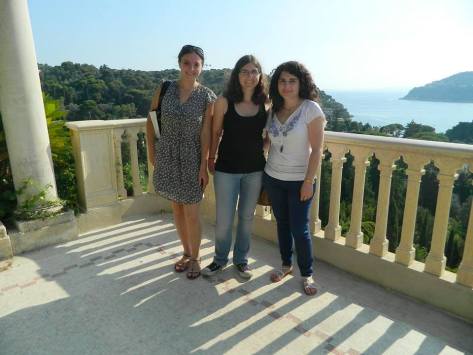Hello!
Back again to this little blog, after 2 months, as per usual. In the meantime, quite a few things have happened: I’ve left Spain in June, nine days after the last post, and it was quite an emotional, bittersweet moment, as I had anticipated. I went back home for a week, which was refreshing, then off I went again, to France this time, which is where I am right now. I am in Nice, on the Côte d’Azur, on a sort of translation internship. It is more like freelance translation, actually: I have no fixed timetable, I don’t have to go to an office every day, and I am on my own for most of the day. I have only one task, but it is more than enough to fill this summer: I am in charge of the Italian translation of a French manual of highly specialised surgical anatomy, Atlas d’Anatomie Chirurgicale de la Face et du Cou, whose first edition, albeit shorter than this one, has been translated into English and goes by the title Atlas of Surgical Anatomy of the Face and Neck. It has been written by the doctor for whom I am working, it’s 335 pages and it’s quite challenging, which is good.
Before I started working on the translation, I had time to be a tourist in Nice. Here be some pictures:
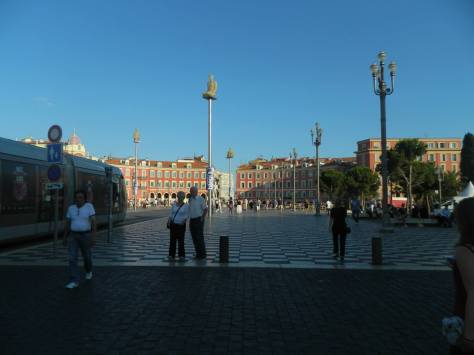
Place Masséna, Nice’s central square
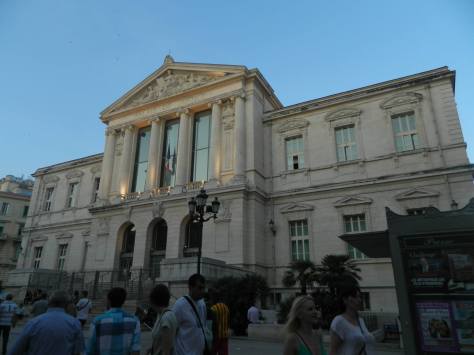
The Palais de Justice
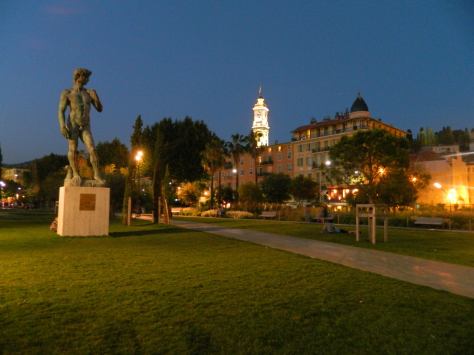
Les jardins du Paillon
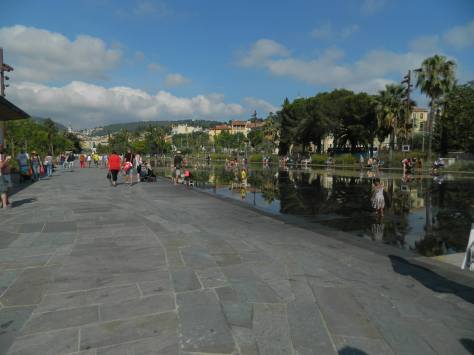
Le Miroir d’Eau
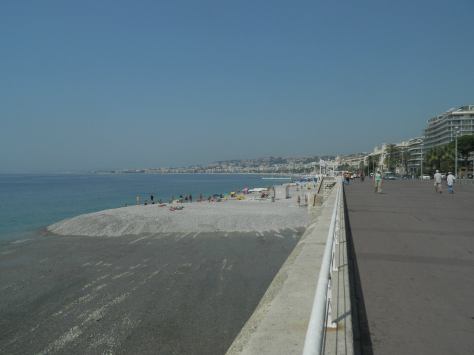
Promenade des Anglais
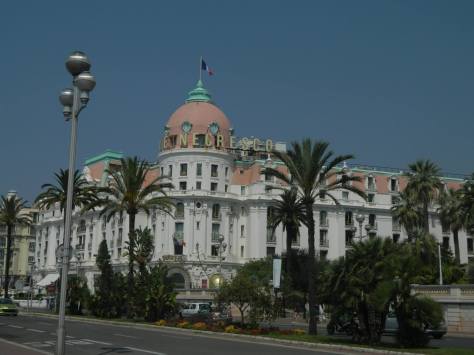
The Hotel Negresco
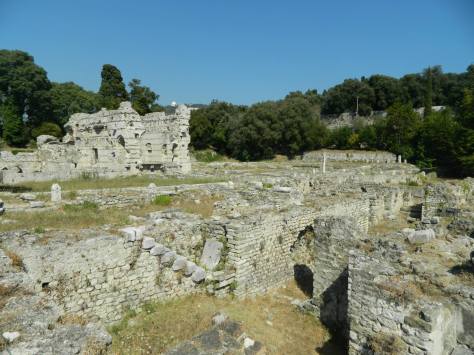
Musée archéologique de Nice-Cimiez
 Apart from this, I’ve found time for some trips. When I arrived here, my original plan was to take a few days off and go to Paris to see my friends Georgia and Tatiana, since it’s been a long while since my last visit. But then, theatre got in the way, as per usual this year, and I decided instead to spend a couple of days in Avignon, the capital of the Vaucluse department, about 5 hours from Nice by high-speed train, for the Festival. The Festival of Avignon is a huge summer event that’s been around since 1947, and everything revolves mainly around theatre: I’m not joking when I say that the whole town was covered in posters of theatre plays, and there were so many people in the streets you almost couldn’t walk (although it all looks pretty tidy in the following photo).
Apart from this, I’ve found time for some trips. When I arrived here, my original plan was to take a few days off and go to Paris to see my friends Georgia and Tatiana, since it’s been a long while since my last visit. But then, theatre got in the way, as per usual this year, and I decided instead to spend a couple of days in Avignon, the capital of the Vaucluse department, about 5 hours from Nice by high-speed train, for the Festival. The Festival of Avignon is a huge summer event that’s been around since 1947, and everything revolves mainly around theatre: I’m not joking when I say that the whole town was covered in posters of theatre plays, and there were so many people in the streets you almost couldn’t walk (although it all looks pretty tidy in the following photo).
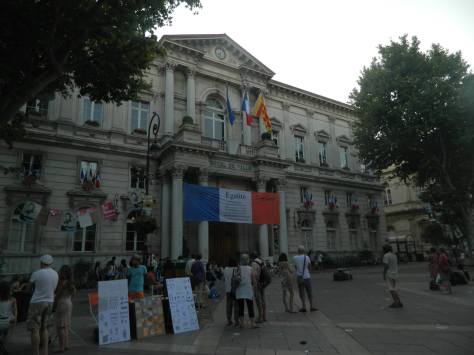
Hôtel de Ville, Avignon
 I went to Avignon to see only one play, a co-production between Madrid’s Teatro de la Abadía and the Festival of Avignon called Hacia la alegría – Vers la joie (‘Towards Happiness’) (extracts), an adaptation of the first chapter of Excelsior, the latest book by Olivier Py, a French stage director, actor and writer, director of the very Festival of Avignon (and Paris’ Odéon – Théâtre de l’Europe between 2007 and 2012). It was entirely in Spanish, but with French surtitles. It was a long, complex monologue, only one character on stage (played by, guess who?, my favourite Spanish actor. I’m basically seeing all the plays he’s in while I can, it’s highly unlikely I’ll see him in Britain or in Italy, so I’m seizing every opportunity, and I’ve been incredibly, incredibly lucky so far) and a string quartet (Nelson Quartet). The plot in itself is quite simple: a famous architect suddenly wakes up one night and has a sort of Joycean epiphany leading him to realise his life has lost its meaning and to reject all he has done, all his successful career implicitly based on society’s crave for the ephemeral products of consumerism, even in architecture, and goes out into the night, running through the glossy, rich neighbourhoods of the city towards the decrepit, poorest areas, to the filthiest places, where his run ends and he feels he’s got back to the genuineness of life he’d lacked. It wasn’t too long, only 1h30, but, as he later told me, he thought it was the most demanding role of his career, both physically and mentally (he kept running and speaking in a refined, philosophical lexicon all the time, I think I would have collapsed after 5 minutes). It was an amazing experience, just like the previous two.
I went to Avignon to see only one play, a co-production between Madrid’s Teatro de la Abadía and the Festival of Avignon called Hacia la alegría – Vers la joie (‘Towards Happiness’) (extracts), an adaptation of the first chapter of Excelsior, the latest book by Olivier Py, a French stage director, actor and writer, director of the very Festival of Avignon (and Paris’ Odéon – Théâtre de l’Europe between 2007 and 2012). It was entirely in Spanish, but with French surtitles. It was a long, complex monologue, only one character on stage (played by, guess who?, my favourite Spanish actor. I’m basically seeing all the plays he’s in while I can, it’s highly unlikely I’ll see him in Britain or in Italy, so I’m seizing every opportunity, and I’ve been incredibly, incredibly lucky so far) and a string quartet (Nelson Quartet). The plot in itself is quite simple: a famous architect suddenly wakes up one night and has a sort of Joycean epiphany leading him to realise his life has lost its meaning and to reject all he has done, all his successful career implicitly based on society’s crave for the ephemeral products of consumerism, even in architecture, and goes out into the night, running through the glossy, rich neighbourhoods of the city towards the decrepit, poorest areas, to the filthiest places, where his run ends and he feels he’s got back to the genuineness of life he’d lacked. It wasn’t too long, only 1h30, but, as he later told me, he thought it was the most demanding role of his career, both physically and mentally (he kept running and speaking in a refined, philosophical lexicon all the time, I think I would have collapsed after 5 minutes). It was an amazing experience, just like the previous two.
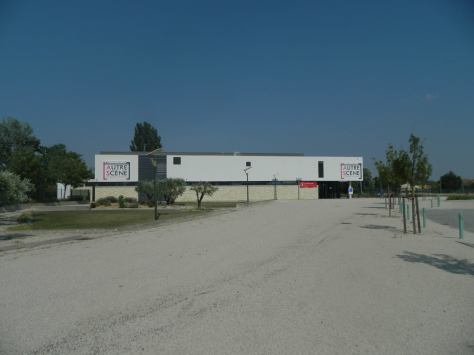
L’Autre Scène du Grand Avignon in Vedène, where the play took place
 But this wasn’t all I did in Avignon. My train back to Nice was at 5 pm on the following day, so I had a whole morning and part of the afternoon to myself. I went to the Palais des Papes, the Papal Palace, which I had seen when I was a child but didn’t really remember, hence seeing it at 22 was much better. I got there quite early, so there was almost nobody around and I could see all those stately rooms and the gardens without any large tourist groups in the way.
But this wasn’t all I did in Avignon. My train back to Nice was at 5 pm on the following day, so I had a whole morning and part of the afternoon to myself. I went to the Palais des Papes, the Papal Palace, which I had seen when I was a child but didn’t really remember, hence seeing it at 22 was much better. I got there quite early, so there was almost nobody around and I could see all those stately rooms and the gardens without any large tourist groups in the way.
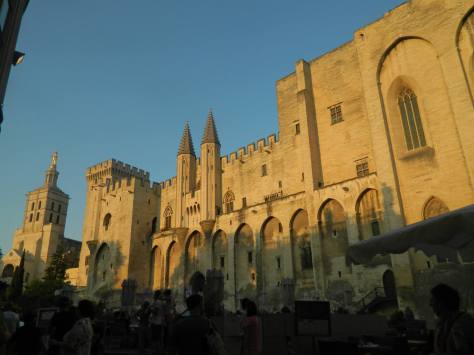
Palais des Papes, evening…
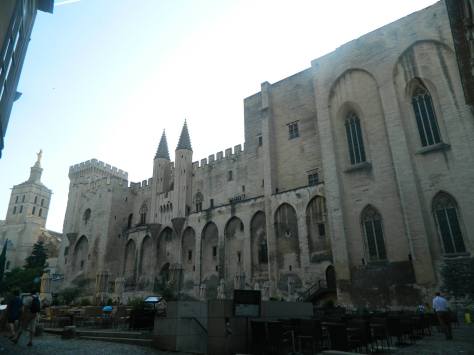
… and morning

 I also went to the Pont Saint-Bénézet, a medieval bridge on the river Rhône also known as Pont d’Avignon (the one of the popular jingle Sur le Pont d’Avignon).
I also went to the Pont Saint-Bénézet, a medieval bridge on the river Rhône also known as Pont d’Avignon (the one of the popular jingle Sur le Pont d’Avignon).
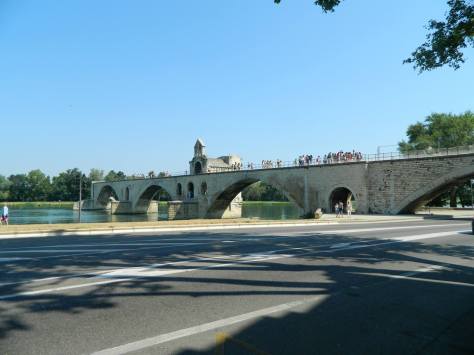
Pont Saint-Bénézet
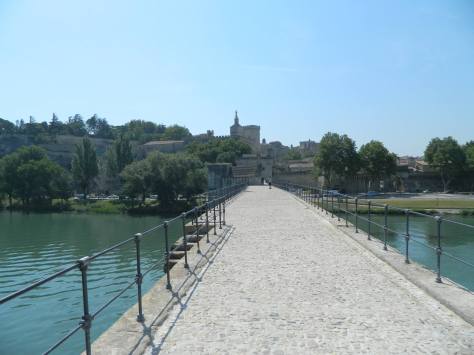
Avignon as seen from the bridge
 Then, it was too hot outside to even think, so I retreated from the river to the city centre, had a salad and then went to the FNAC to spend an entire hour browsing books and dvds, and then I found this:
Then, it was too hot outside to even think, so I retreated from the river to the city centre, had a salad and then went to the FNAC to spend an entire hour browsing books and dvds, and then I found this:

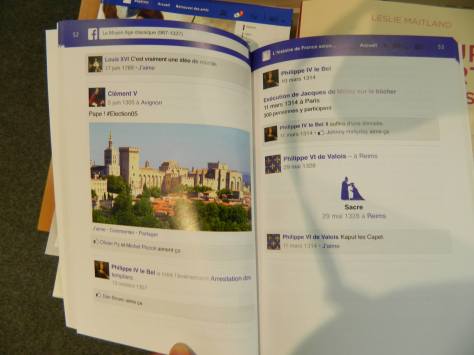
L’histoire de France selon Facebook (‘The History of France According to Facebook’). I frankly lost it at “Olivier Py likes this”. Yes, I know, it takes very little to amuse me.
I came back home from Avignon in very high spirits, even more so because I knew that a week later my mum would be popping to Nice for a short visit. When she arrived, on 18thJuly, we realised we had seen almost everything Provence had to offer, apart from, well, its capital. So, off to Marseille!
It was an incredibly hot day, I even got sunburnt a bit, but it was thoroughly enjoyable (the trip, not my aching red shoulders). We didn’t have much time to spend there, we had but an afternoon, so we mainly stayed in the area of the Old Port and the lower part of the Canebière, the city’s largest boulevard.
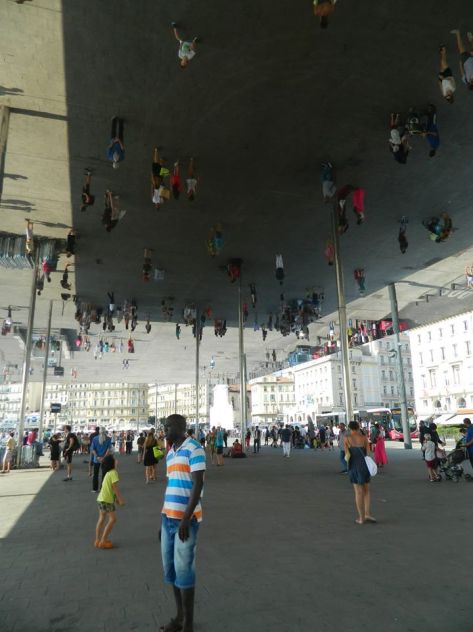
Marseille, Vieux Port, Quai des Belges
 The main highlight of the day, though, was the trip to the Château d’If, a 16th-century fortress and royal prison that is one of the most iconic settings of Alexandre Dumas’ The Count of Monte Cristo, one of my favourite novels.
The main highlight of the day, though, was the trip to the Château d’If, a 16th-century fortress and royal prison that is one of the most iconic settings of Alexandre Dumas’ The Count of Monte Cristo, one of my favourite novels.
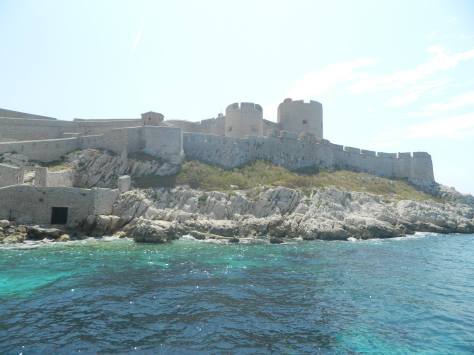
“Dantès se leva, jeta naturellement les yeux sur le point où paraissait se diriger le bateau, et à cent toises devant lui il vit s’élever la roche noire et ardue sur laquelle monte comme une superfétation du silex le sombre château d’If. Cette forme étrange, cette prison autour de laquelle règne une si profonde terreur, cette forteresse qui fait vivre depuis trois cents ans Marseille de ses lugubres traditions, apparaissant ainsi tout à coup à Dantès qui ne songeait point à elle, lui fit l’effet que fait au condamné à mort l’aspect de l’échafaud.” (A. Dumas, “Le Comte de Monte-Cristo”, c. VIII)
 The protagonist, Edmond Dantès, is imprisoned, albeit innocent, at the beginning of the story, and he’s kept here for fourteen years, together with his mentor, Abbé Faria. History and fiction combine as you enter the main court of the castle and see that, apart from Dumas’ opera omnia in the shop, there are some cells that held not only historical characters, such as Honoré Gabriel Riqueti, comte de Mirabeau, but also fictional ones. There’s Dantès cell, there’s Abbé Faria’s, they’ve even dug the small tunnel between them that Dumas created in his story, and then there’s the cell of the mysterious Man in the Iron Mask, an actual historical character also appearing in Dumas’ The Vicomte of Bragelonne, third and final instalment of The Three Musketeers saga. I’m quite a huge Dumas fan, so it was incredibly exciting.
The protagonist, Edmond Dantès, is imprisoned, albeit innocent, at the beginning of the story, and he’s kept here for fourteen years, together with his mentor, Abbé Faria. History and fiction combine as you enter the main court of the castle and see that, apart from Dumas’ opera omnia in the shop, there are some cells that held not only historical characters, such as Honoré Gabriel Riqueti, comte de Mirabeau, but also fictional ones. There’s Dantès cell, there’s Abbé Faria’s, they’ve even dug the small tunnel between them that Dumas created in his story, and then there’s the cell of the mysterious Man in the Iron Mask, an actual historical character also appearing in Dumas’ The Vicomte of Bragelonne, third and final instalment of The Three Musketeers saga. I’m quite a huge Dumas fan, so it was incredibly exciting.
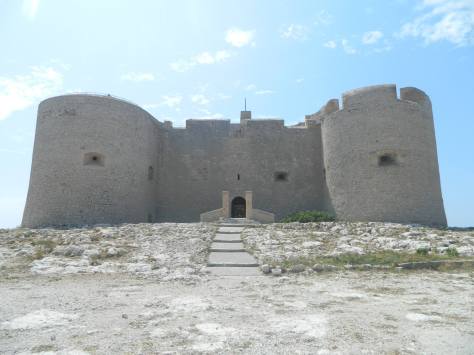
The fortress
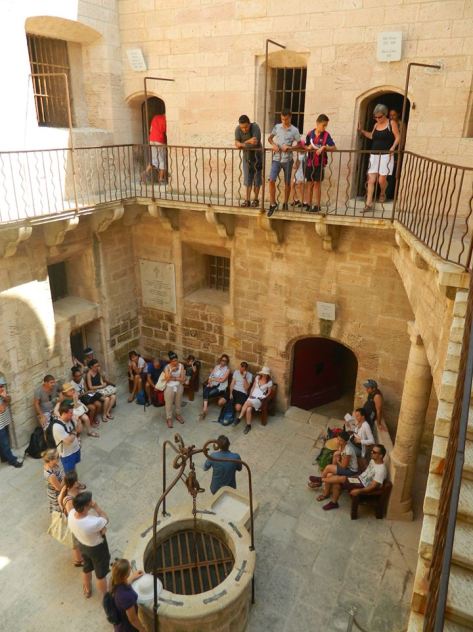
Inside the fortress
The happy memories I had from those days helped me cheer up a bit a week later, when, one evening, I had a bit of an existential crisis. I don’t exactly recall how it started, but what matters is that I got to the point of realising that I don’t really have a precise goal, an idea of an actual future job after university. I know I have to do a MA after the BA, and there’s one that might be potentially interesting, but the very thought of keeping studying is not at all appealing to me right now. Maybe it’s just a phase, but for an entire evening I felt like an utterly useless sort of future professional. I speak four languages, what now? Translators and, in general, language specialists are an invisible category, but this doesn’t mean, unfortunately, that we are éminences grises. We are more often than not shamelessly ignored. When I go to museums and I have a look at tourist guides in several languages, I often see that the name of the translator is nowhere to be seen. Maybe I stumbled upon the rare cases where the writer is a translator too and he/she translated his/her own text into other languages, but it can’t always be like that. It’s statistically impossible. The translations are sometimes exceedingly good, and it pains me to see that the person who spent perhaps entire days on the text doesn’t have his/her work acknowledged on the final product. Of course they haven’t worked for free, or at least I hope so, but why then do we see on the translated tourist guide all the names of photographers, writers, historical consultants involved, and not the one of the translator? I don’t know, perhaps I’m just very bitter and discouraged, perhaps it’s just another of my down phases, when I can’t see that there must be after all something I can do in this world, that I’m an intelligent person with some useful skills, but really, I would just like to finally find something to do, because this confusion is sometimes too frustrating to bear. And, for once, I would like to have someone, preferably a friend, telling me “I know it’s hard, but we can make it through, you don’t have to be alone”, instead of the usual refrain I’ve had to hear all my life: “But you’re so good, I’m sure you can cope, you’ll figure it out and make it through. Tanto tu sei brava.”. I know I can be good and figure it out by myself, thank you very much, but for once I’d like to be the one receiving help instead of giving it.
Phew.
Writing that down helped quite a lot. Whoever said that writing about your concerns to explain them to other people is cathartic was bloody right. I hope the new year at UEA will help me realise what I want to do with my future, but in the meantime I’ll just keep working on my anatomy tome and enjoy my French stay.
I don’t know when I will write next, perhaps in Norwich, after my theatre day in London (Hamlet with Benedict Cumberbatch and Farinelli and the King with Mark Rylance, it’ll be a great day!), or shortly after.
Until then, have a lovely summer break!
À bientôt!
Ps. If I’m enjoying Nice this much, it’s mainly thanks to one person, my friend Vanessa, who’s been not only a fantastic tourist guide, but a great friend too. And a person with the quite astonishing ability to read me like an open book, which I myself can’t do. Thanks, Vanessa, and thanks to lovely Sandra and Sarah. 😀
